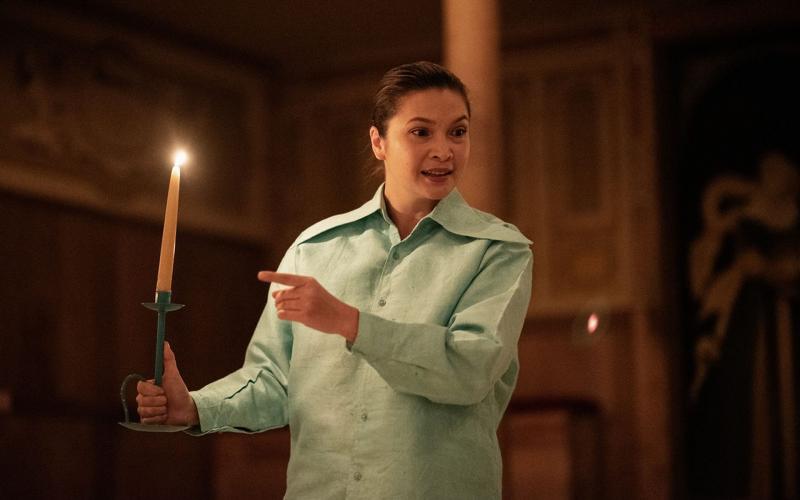Titus Andronicus, Sam Wanamaker Playhouse review - notorious play hits and misses | reviews, news & interviews
Titus Andronicus, Sam Wanamaker Playhouse review - notorious play hits and misses
Titus Andronicus, Sam Wanamaker Playhouse review - notorious play hits and misses
Tricksy staging distracts and disappoints

If All's Well That Ends Well, Measure for Measure and Troilus and Cressida have earned the sobriquet "‘problem plays", what price Titus Andronicus? Does a director seek out a Saw vibe for the horror? Do they go for a deadpan Spinal Tap’s disappearing drummers for the demises?
We open on our flawed hero returning to a Rome shorn of its Caesar and, as a consequence of his decade-long successful campaign against the Goths, Titus is invited to be Emperor. Citing his age, he declines and nominates the impetuous elder son of the dead emperor, Saturninus, for the throne, to the chagrin of his calmer younger brother Bassianus – the, if I dare use the word these days, spare. Appealing to the Gods, Titus sacrifices Tamora, Queen of the Goths, which is dangerous indeed when Saturninus takes her for his bride, bringing her two psychotic sons and scheming, Iagoish lover, Aaron, into the court. The body count is already up and running and there’s time for plenty more, and, boy, do we get them - though not quite in the style we may have expected.
 Some performances manage to steer a course through the miasma of Christian’s tonal shifts. Kibong Tanji (pictured above) is magnificent as the smart and cruel Aaron, the Moor who meets Rome’s raw racism with revenge served both hot and cold. Beau Holland gives us a range of comic characters in an Irish brogue (think of a succession of Father Dougal McGuires, but in a charnel house, not a priest’s house). Lucy McCormick’s watchable, mad-eyed adolescent Emperor Saturninus owes something to John Hurt’s Caligula in the BBC’s I, Claudius, albeit with a pathos due to his vulnerability.
Some performances manage to steer a course through the miasma of Christian’s tonal shifts. Kibong Tanji (pictured above) is magnificent as the smart and cruel Aaron, the Moor who meets Rome’s raw racism with revenge served both hot and cold. Beau Holland gives us a range of comic characters in an Irish brogue (think of a succession of Father Dougal McGuires, but in a charnel house, not a priest’s house). Lucy McCormick’s watchable, mad-eyed adolescent Emperor Saturninus owes something to John Hurt’s Caligula in the BBC’s I, Claudius, albeit with a pathos due to his vulnerability.
If a cast (all female / non-binary) absurdly clad in Marks and Spencer pyjamas – tasteful pastel shades – did not excise most of the terror that we were promised in a framing device that comprised a jolly singalong to George Heyworth and Liv Morris’s opening song, the staging of the deaths certainly does. Each character is represented by a candle that is extinguished (and sometimes violently destroyed) when they die. The sensational horror that Shakespeare intended (as popular in the 1590s as the Scream slasher franchise was in the 1990s) is reduced to a kind of half-hearted Edward Scissorhands snip and walk-off. Of course, not all theatre needs to be literal, but after all those trigger warnings and the macabre murder ballad that The Tiger Lillies would have enjoyed, surely a bit of gore was in order?
That said, the pantomime elements fade into the background and the laughs shrivel in the throat when we see the trauma of Lavinia (Georgia-Mae Myers), raped and mutilated and allowed to live long enough in order to be murdered by her father, Titus (Katy Stephens). How can her fate be intermittently shoehorned into a narrative we were chuckling along with not a few moments ago? Not like this, that’s for sure.
I was about 12 years of age when first I heard of Titus Andronicus, in the context of the splendid British black comedy, Theatre Of Blood. As an actor exacts revenge on the press in a series of murders each borrowing from a Shakespeare play, Robert Morley’s pompous critic is tricked into eating his beloved poodles baked into a pie – this play the source.
Late on a Friday night in the 1970s, that film was a regular on the BBC’s midnight movie rota, its appeal rooted in the deliciously transgressive feeling that “I know I shouldn’t laugh, but I did”. Too much of this 2023 production’s bold hotchpotch of good and bad taste targets that emotion, but it's more a matter of “I know I shouldn’t laugh, and I didn’t”.
The future of Arts Journalism
You can stop theartsdesk.com closing!
We urgently need financing to survive. Our fundraising drive has thus far raised £49,000 but we need to reach £100,000 or we will be forced to close. Please contribute here: https://gofund.me/c3f6033d
And if you can forward this information to anyone who might assist, we’d be grateful.

Subscribe to theartsdesk.com
Thank you for continuing to read our work on theartsdesk.com. For unlimited access to every article in its entirety, including our archive of more than 15,000 pieces, we're asking for £5 per month or £40 per year. We feel it's a very good deal, and hope you do too.
To take a subscription now simply click here.
And if you're looking for that extra gift for a friend or family member, why not treat them to a theartsdesk.com gift subscription?
more Theatre
 The Producers, Garrick Theatre review - Ve haf vays of making you laugh
You probably know what's coming, but it's such great fun!
The Producers, Garrick Theatre review - Ve haf vays of making you laugh
You probably know what's coming, but it's such great fun!
 Not Your Superwoman, Bush Theatre review - powerful tribute to the plight and perseverance of Black women
Golda Rosheuvel and Letitia Wright excel in a super new play
Not Your Superwoman, Bush Theatre review - powerful tribute to the plight and perseverance of Black women
Golda Rosheuvel and Letitia Wright excel in a super new play
 Cow | Deer, Royal Court review - paradox-rich account of non-human life
Experimental work about nature led by Katie Mitchell is both extraordinary and banal
Cow | Deer, Royal Court review - paradox-rich account of non-human life
Experimental work about nature led by Katie Mitchell is both extraordinary and banal
 Deaf Republic, Royal Court review - beautiful images, shame about the words
Staging of Ukrainian-American Ilya Kaminsky’s anti-war poems is too meta-theatrical
Deaf Republic, Royal Court review - beautiful images, shame about the words
Staging of Ukrainian-American Ilya Kaminsky’s anti-war poems is too meta-theatrical
 Laura Benanti: Nobody Cares, Underbelly Boulevard Soho review - Tony winner makes charming, cheeky London debut
Broadway's acclaimed Cinderella, Louise, and Amalia reaches Soho for a welcome one-night stand
Laura Benanti: Nobody Cares, Underbelly Boulevard Soho review - Tony winner makes charming, cheeky London debut
Broadway's acclaimed Cinderella, Louise, and Amalia reaches Soho for a welcome one-night stand
 The Pitchfork Disney, King's Head Theatre review - blazing with dark energy
Thrilling revival of Philip Ridley’s cult classic confirms its legendary status
The Pitchfork Disney, King's Head Theatre review - blazing with dark energy
Thrilling revival of Philip Ridley’s cult classic confirms its legendary status
 Born with Teeth, Wyndham's Theatre review - electric sparring match between Shakespeare and Marlowe
Rival Elizabethan playwrights in an up-to-the-minute encounter
Born with Teeth, Wyndham's Theatre review - electric sparring match between Shakespeare and Marlowe
Rival Elizabethan playwrights in an up-to-the-minute encounter
 Interview, Riverside Studios review - old media vs new in sparky scrap between generations
Robert Sean Leonard and Paten Hughes make worthy sparring partners
Interview, Riverside Studios review - old media vs new in sparky scrap between generations
Robert Sean Leonard and Paten Hughes make worthy sparring partners
 Fat Ham, RSC, Stratford review - it's Hamlet Jim, but not as we know it
An entertaining, positive and contemporary blast!
Fat Ham, RSC, Stratford review - it's Hamlet Jim, but not as we know it
An entertaining, positive and contemporary blast!
 Juniper Blood, Donmar Warehouse review - where ideas and ideals rule the roost
Mike Bartlett’s new state-of-the-agricultural-nation play is beautifully performed
Juniper Blood, Donmar Warehouse review - where ideas and ideals rule the roost
Mike Bartlett’s new state-of-the-agricultural-nation play is beautifully performed
 The Gathered Leaves, Park Theatre review - dated script lifted by nuanced characterisation
The actors skilfully evoke the claustrophobia of family members trying to fake togetherness
The Gathered Leaves, Park Theatre review - dated script lifted by nuanced characterisation
The actors skilfully evoke the claustrophobia of family members trying to fake togetherness
 As You Like It: A Radical Retelling, Edinburgh International Festival 2025 review - breathtakingly audacious, deeply shocking
A cunning ruse leaves audiences facing their own privilege and complicity in Cliff Cardinal's bold theatrical creation
As You Like It: A Radical Retelling, Edinburgh International Festival 2025 review - breathtakingly audacious, deeply shocking
A cunning ruse leaves audiences facing their own privilege and complicity in Cliff Cardinal's bold theatrical creation

Add comment